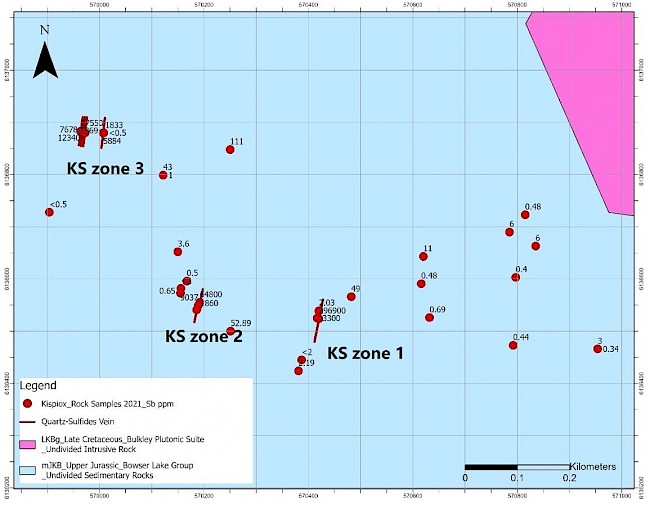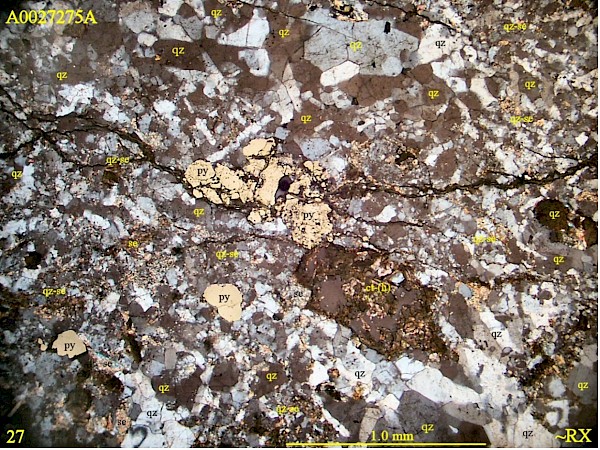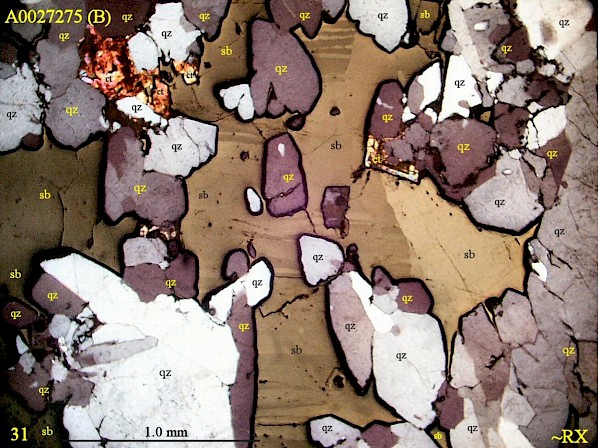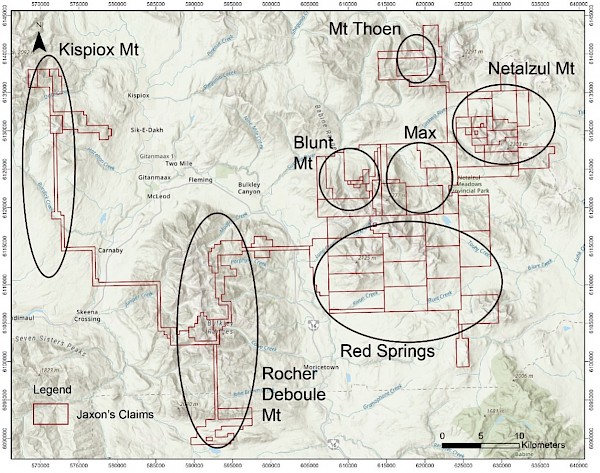May 23, 2023, Vancouver, Canada – Jaxon Mining Inc. (“Jaxon” or the “Company”) (TSX.V: JAX, FSE: 0U31, OTC: JXMNF) is pleased to announce the results of a petrographic study confirming the discovery of high-grade antimony mineralization at the Kispiox Mountain Project. Conducted by John G. Payne, Ph.D., P.Geo., of Surrey, B.C, Canada, the study describes the petrography of sampled stibnite mineralization and confirms the discovery of three high-grade stibnite-bearing epithermal zones in the propylitically altered areas above what the Company’s model concludes to be another deeper Cu-Ag-Au, Zn-Mo porphyry mineralized system; geologically analogous to Jaxon’s Netalzul Mountain and Red Springs porphyry targets.
The discovery of the three zones of massive to disseminated sulfides high-grade antimony epithermal mineralization at the Kispiox Mountain Project was made in 2021. Assay results of the rock samples collected from the outcrops were released March 10, 2022 (Figures 1-2, Table 1).
https://jaxonmining.com/news/2022/jaxon-samples-up-to-29.69-antimony-at-kispiox-mountain/
Antimony is listed on the critical mineral lists published by the governments of USA, Canada, and European Union. According to the United States Geological Survey (https://www.usgs.gov/), in 2022, China accounted for 54.5% of total antimony production, followed by Russia (18.2%) and Tajikistan with (15.5%).

Figure 1. Three Sb sulfide-quartz mineralization zones (KS zones 1, 2 and 3) at Kispiox Mountain Project.
Table 1. Sample Details from Petrographic Study Report of Kispiox Mountain Project
| Sample ID | Description | Ag ppm | Au ppm | Cu ppm | Pb ppm | Sb ppm | Zn ppm |
| A0027254 | 10-15 cm wide vein, antimony, stibnite, massive sulfide | 0.7 | 0.02 | 95 | 68 | 296900 | 18 |
| A0027255 | Composite sample, 10 m wide, hornfels with disseminated sulfides, mainly antimony | 1.1 | 0.03 | 94 | 13 | 3300 | 36 |
| A0027274 | Silicified dacite dyke with quartz veins and stibnite veins, 2m chip sample. Str. fractured. The width of stibnite veins varies from 10 cm to 0.5 mm. High grade, containing four wide stibnite veins, 10 cm, 3cm, <1cm, <1cm, and many stibnite veinlets | 0.5 | <0.01 | 55 | 41 | 64800 | 70 |
| A0027275 | 2-meter chip sample, containing three stibnite veins, 5 cm, 3 cm, <1cm, and many stibnite veinlets | 0.5 | <0.01 | 27 | 12 | 9037 | 37 |
| A0027276 | 2-meter chip sample, containing one wide stibnite veins, 3cm, and many stibnite veinlets | 0.5 | <0.01 | 48 | 13 | 1860 | 75 |
| A0027277 | Four parallel quartz-stibnite veins within 2 m width, Strike: 5°, Azimuth: 95°, Dip: 60~65 °. First vein 15 cm wide, 4-meter west of second vein | <0.5 | <0.005 | 31 | 77 | 27550 | 741 |
| A0027278 | Second vein. 3~5 cm wide, 1.5 m west of third vein | <0.5 | <0.005 | 59 | 52 | 7678 | 114 |
| A0027279 | Chip sample, including third vein and fourth vein. Third vein: 5 cm, Fourth vein: 10~15cm. Vein interval: 1.5 m. | <0.5 | <0.005 | 18 | 19 | 12340 | 55 |
| A0027282 | Sb mineralization zone, 8 m wide composite sample with multiple several cm – < 1 cm quartz-sb veins | 1.1 | 0.02 | 68 | 38 | 1833 | 46 |
| A0027283 | <0.5 | 0.009 | 52 | 8 | 5884 | 38 | |
| A0027284 | <0.5 | 0.022 | 63 | 25 | 1869 | 51 |
Highlights of Petrographic Study at the Kispiox Mountain Project
- Three petrographic samples (A0027274, A0027275A and A0027275B) from the KS Zone 2 are of massive to disseminated sulfides.
- Sample A0027274 is zoned, with more abundant patches of finer grained quartz with minor sericite and stibnite and less abundant, coarser grained patches of quartz, stibnite, and calcite, with minor pyrite. Two discontinuous proximal veinlets are of stibnite with envelopes of acicular grains of an unknown mineral (A), probably stibnite, in which grains are oriented perpendicular to the veinlet walls (Figures 3-4).
- Sample A0027275 (A) contains a large band in the centre of altered host rock dominated by very fine grained, in part elongate prismatic quartz, with disseminated patches of sericite and scattered patches of calcite, of pyrite, and of stibnite. A small patch is of calcite with a thin rim of sericite. The vein material is of fine to medium grained quartz and stibnite, with quartz commonly having euhedral terminations against stibnite (Figure 5).
- Sample A00275275 (B) contains scattered patches up to a few mm across of altered host rock (hornfels) consisting of one or more quartz, sericite, and calcite. These are contained in a vein that is dominated by quartz with abundant stibnite along one side of the section (Figure 6).
The petrographic study shows the mineralization at Kispiox Mountain is dominated by quartz-stibnite veins with lesser amounts of carbonate minerals (calcite) and minor amounts of pyrite with very strong siliceous and phyllic alteration.
Mineral Exploration Tax Credits
The Company is pleased to announce that in February 2023 it received its British Columbia Mineral Exploration Tax Credit (“BCMETC”) in the amount of CAD$741,890.96, generated from qualified exploration incurred in 2021. The BCMETC is calculated as 20% of qualified mining exploration expenses incurred in BC by eligible corporations, with an enhanced rate of 30% available for qualified mineral exploration undertaken in prescribed Mountain Pine Beetle affected areas. The BCMETC reduced Jaxon’s qualified exploration costs by the amount of the credit.
The Critical Mineral Exploration Tax Credit (“CMETC”) is a new 30% investment tax credit available to investors. The credit would apply to specified exploration expenditures renounced to investors under eligible flow through share agreements. The CMETC doubles the 15% non-refundable tax credit previously available to investors under the existing Mineral Exploration Tax Credit (“METC”). The CMETC applies to 15 critical minerals, including copper and zinc. The predominance of copper and zinc in the porphyry systems which Jaxon is targeting at the Hazelton Property should qualify the Company to raise funds under the new CMETC requirements. The CMETC will be a valuable tool in assisting the Company in raising funds to support continued exploration and planned confirmation drilling programs at the Kispiox Mountain, Netalzul Mountain and Red Springs projects on the Hazelton Property.
Mr. John King Burns, CEO of Jaxon Mining, commented,“The Company wishes to thank Dr. Payne for his petrographic report. This study is part of Jaxon’s systematic approach to exploration in advance of confirmation drilling. The petrologic results, together with the geological mapping, soil geochemistry and magnetic survey results, already in hand, will be used to design a backpack and portable rig drilling program.”
“These high-grade antimony results confirm the pervasive nature of mineralization at Kispiox Mountain. Given what we know, we may have discovered what is potentially the largest, high-grade, pure antimony deposit in North America sitting on top our third major porphyry target. A further systematic soil and sulfide rock outcrop channel sampling program followed by backpack and portable rig drilling are planned for the summer of 2023. The elevated values of Cu, Mo, Pb. Zn, and As elements in the strongly oxidized hornfels suggest a potential genetic relation between the epithermal stibnite mineralization and a deep porphyry system at Kispiox Mountain.”

Figure 2. Chip samples taken from across six metres at KS zone 2 outcrop at Kispiox Mountain Project.

Figure 3. Thin section of sample A0027274, intergrowth of quartz, stibnite (showing strong anisotropism), calcite, minor sericite, and a patch of pyrite; numerous cavities.

Figure 4. Thin section of sample A0027274, aggregate of quartz with a few patches containing minor to accessory sericite, disseminated patches of stibnite; veinlet of stibnite with envelope containing abundant acicular grains of an unknown mineral (A; probably stibnite) oriented subperpendicularly to the veinlet.

Figure 5. A0027275A, altered host rock/early vein: quartz with disseminated patches of sericite, single grains and a cluster of pyrite, and a patch of calcite-(limonite) that was moderately lost from the section due to plucking; coarser grained zone of quartz at the bottom is the edge of the vein (reformatted).

Figure 6. Intergrowth of stibnite (showing anisotropism) and quartz, with minor calcite.
About Kispiox Mountain Project
Location
The Kispiox Mountain project is located approximately 16 km northwest of New Hazelton, BC, and 70 km northwest of Smithers, BC. It is one of seven projects 100% owned by Jaxon Mining Inc.

Figure 7. Map of the Hazelton Property, near Smithers, British Columbia
Historical Works
Limited historical work has been carried out at the Kispiox project area. Only one Minfile showing (“Date”) is recorded on the Kispiox project area.
The Date showing is located on the southeast flank of Kispiox Mountain, 19 kilometers northwest of Hazelton. The area is underlain by sedimentary rocks of Late Jurassic Bowser Lake Group, which intruded by small granodiorite body of the Late Cretaceous Bulkley Intrusions. Noranda Exploration Company Limited carried out exploration activities on the Date showing area due to anomalous molybdenum contents in silt samples and trace chalcopyrite observed in the field. During July 1981 and 1983, Noranda Exploration Company Limited conducted geological and geochemical surveys on the Date showing area. 195 soil samples and 6 rock samples were collected and analyzed in 1981, and 18 rock samples were collected and assayed in 1983. Anomalous Au, Ag, Cu, Mo, Pb, and Zn were found in various rock and soil samples. Due to the rugged nature of the terrain, the exploration work was of a limited extent (P. McCarter, 1981 and Delbert Myers, 1983).
There has been no previous trenching and drilling sampling at the Kispiox area.
Geology
The Kispiox project is underlain by a series of sedimentary strata of the Late Jurassic Bowser Lake Group and Lower Cretaceous Kitsuns Creek Formation of Skeena Group, which have been intruded by numerous Late Cretaceous porphyritic intrusions of Bulkley Plutonic Suite.
Mineralization
The associated quartz-sulfide veins are centered on the area of most abundant intrusive rocks, and the veins are most prevalent along the margins of the intrusions and sheared contact zones (P. McCarter, 1981). A great amount of stibnite was observed in the veins, and trace amount of very fine-grained chalcopyrite and molybdenite were also noticed within and adjacent to the veins. The sulfides are mostly fine-grained and disseminated in the veins. Pyrite is common on the quartz veins, and as fracture coating in the hornfels.
Taking into consideration the widespread rusty pyritic zone, intrusive dikes and plugs, mineralized quartz veins, and anomalous Cu, Mo, Sb values, a porphyry-epithermal Sb-Cu-Mo system is interpreted to exists at the Kispiox project.
Sample Preparation and Analyses
Chip and prospecting samples were collected in the field by experienced, professional prospectors and geological staff who selected hand samples from outcrops, chip samples, boulder, and talus debris samples suitable for slabbing by rock saw. The samples were numbered, described, and located in the field for follow-up. Numbered rock samples tags were placed inside each bag, securely closed for transport to the Company’s secure cold storage locked facility in Smithers, B.C. Representative sample slabs were cut from large specimens and halved rock samples so that portions of select samples could be saved for the Company’s rock library, descriptive purposes, and petrographic study. MS Analytical of Langley, B.C. received the Rice Bag shipments after secure transport from Smithers. Samples were prepared by crushing, grinding, and pulverizing to a pulp with barren material washing between each sample at the crush and pulverizing stages. Then 20 g of pulp was used for the (IMS-117 code) ultra-trace level ICP/MS AR digestion method, and four acid 0.2 g ore grade ICP – AES method (ICP-240) and for the overlimit gold the FAS-415 method of 30 g fusion Gravimetric method was used to report gold ASSAYS. Overlimit silver is determined by Fire ASSAY 415 method. Laboratory standards and QA–QC is monitored by the Company.
Qualified Person
Yingting (Tony) Guo, P.Geo., President and Chief Geologist of Jaxon Mining Inc., a Qualified Person as defined by National Instrument 43-101, has reviewed and prepared the scientific and technical information and verified the data supporting such scientific and technical information contained in this news release.
About Jaxon Mining Inc.
Jaxon pursues the discoveries of deeper, under cover, commercial scale and high-grade Cu, Au, Ag, polymetallic porphyry epithermal systems. Jaxon has seven large-scale porphyry system targets on its 100% controlled Hazelton property, an interconnected network of concessions spanning ~730 km2 in the Skeena Arch in northwest British Columbia, Canada. The Company’s flagship projects Netalzul Mountain and Red Springs are drill ready. The Kispiox Mountain and Blunt Mountain projects both host extensive and high-grade occurrences of antimony, a strategic and critical metal as designated by the governments of Canada and United States.
ON BEHALF OF THE BOARD OF DIRECTORS
JAXON MINING INC.
“John King Burns”
John King Burns, Chairman
For more information, please contact:
Investor Relations
Kaye Wynn Consulting
T: 604-558-2630
TF: 1-888-280-8128
E: info@kayewynn.com
Corporate & Investor Relations
T: 604-424-4488
E: info@jaxonmining.com
This news release may contain forward-looking information, which is not comprised of historical facts. Forward-looking information involves risks, uncertainties, and other factors that could cause actual events, results, performance, prospects, and opportunities to differ materially from those expressed or implied by such forward-looking information. Forward-looking information in this news release may include but is not limited to, the Company’s objectives, goals, or plans. Factors that could cause actual results to differ materially from such forward-looking information include, but are not limited to, those risks set out in the Company’s public documents filed on SEDAR. Although the Company believes that the assumptions and factors used in preparing the forward-looking information in this news release are reasonable, undue reliance should not be placed on such information, which only applies as of the date of this news release. No assurance can be given that such events will occur in the disclosed time frames or at all. The Company disclaims any intention or obligation to update or revise any forward-looking information, whether as a result of new information, future events or otherwise, other than as required by law. Neither TSX Venture Exchange nor its Regulations Services Provider (as that term is defined in the policies of the TSX Venture Exchange) accepts responsibility for the adequacy or accuracy of this release
